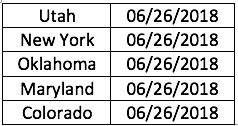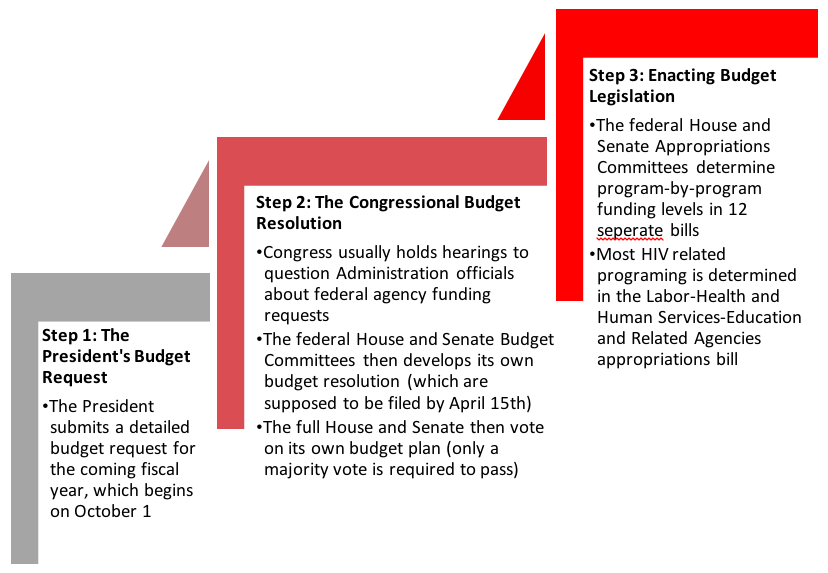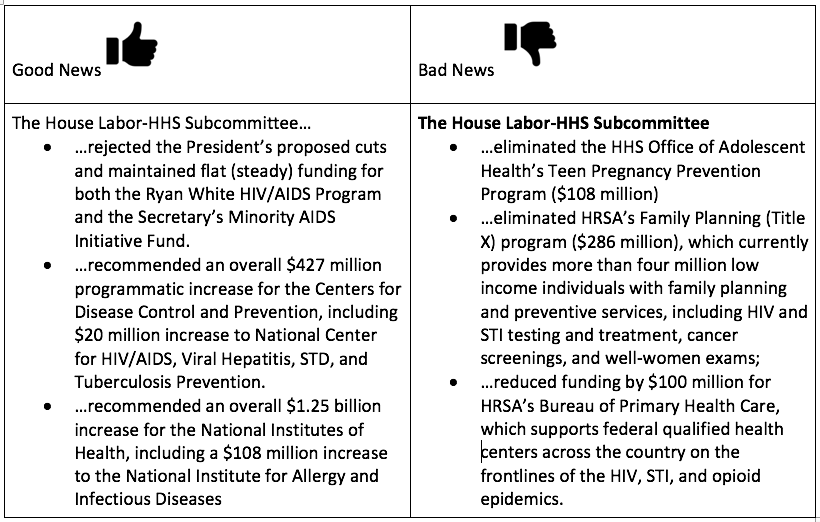Important Happenings in HIV/Health Policy
Week Ending: June 15, 2018
By: Matthew Rose & Sable K. Nelson
House Marking Up Federal Fiscal Year 2019 Appropriations Bill
On Friday, June 15, 2018 the Labor, Health and Human Services (Labor-HHS) Subcommittee of the U.S. House Appropriation Committee marked up its Federal Fiscal Year 2019 (FY19) Appropriations bills. Passing along party lines, the House’s Labor HHS spending bill would increase HHS’s budget by $1 billion for FY19. “Markup” is the process by which a Congress debates, amends, and rewrites proposed legislation. An appropriations bill is a piece of legislation that sets money aside for specific government spending. This is the third step in the Federal Budget Process:
Here are the funding levels proposed by the House Labor-HHS Subcommittee for key HIV/AIDS programs:
The Senate version of the Labor-HHS spending bill set top-line spending $2 billion higher than the House version. It is unknown at this time how those funds will be allocated for each of the Senate Labor-HHS spending bill will be marked up in the upcoming days/weeks.
NEXT STEPS: In the coming weeks, tentatively scheduled for June 26, the full House Appropriations Committee is expected to mark up the Labor-HHS bill. It is likely that several Representatives will propose amendments targeting federal funding for programs impacting minority health, rural health, Title X family planning, operation of supervised consumption facilities, and programs affiliated with the Affordable Care Act that the current spending bill proposes reducing or eliminating.
CDC Releases its 2017 YRBS Data
The Centers for Disease Control and Prevention (CDC) released its latest data from its Youth Risk Behavior Surveillance System (YRBSS). The YRSSS monitors six categories of health-related behaviors that contribute to the leading causes of death and disability among youth and adults, including:
- Behaviors that contribute to unintentional injuries and violence
- Sexual behaviors related to unintended pregnancy and sexually transmitted diseases, including HIV infection
- Alcohol and other drug use
- Tobacco use
- Unhealthy dietary behaviors
- Inadequate physical activity
Below is a table that summarizes the “Progress At-A-Glance for Sexual Behavior Variables:”

For more information, READ → https://www.cdc.gov/healthyyouth/data/yrbs/index.htm; https://www.cdc.gov/healthyyouth/data/yrbs/pdf/trendsreport.pdf
What You Can Do
TAKE ACTION: It is very important that our elected officials hear from us to protect federal HIV funding for HIV prevention and care. Speak truth to power by sharing your personal stories with your elected officials. It is vitally important to meet your federal elected officials when they are at home. If we don’t support and advocate for HIV funding and programs, who will? Our movement cannot afford to stand on the sidelines. Your U.S. Senators and U.S. Representatives need to hear from you.
- Find your U.S. Senators: https://www.senate.gov/general/contact_information/senators_cfm.cfm
- Find your U.S. Representative: https://www.house.gov/representatives/find-your-representative
Also, MAKE SURE THAT YOU ARE REGISTERED TO VOTE in time for the primary and general elections happening this year!
For more information, VISIT→ https://www.eac.gov/voters/register-and-vote-in-your-state/
Finally, PARTICIPATE IN THE PRIMARY ELECTION(S) in your state:
 For more information, VISIT→ http://www.ncsl.org/research/elections-and-campaigns/2018-state-primary-election-dates.aspx
For more information, VISIT→ http://www.ncsl.org/research/elections-and-campaigns/2018-state-primary-election-dates.aspx
What NMAC is Doing About It
- NMAC remains vigilant in its advocacy to protect FY19 government funding and the existence of the social safety net.
- NMAC will meet with hill staff to support amendments that are favorable for our programs.
- NMAC is also working with lawmakers to address PrEP access and HIV in the military in a new partnership.

